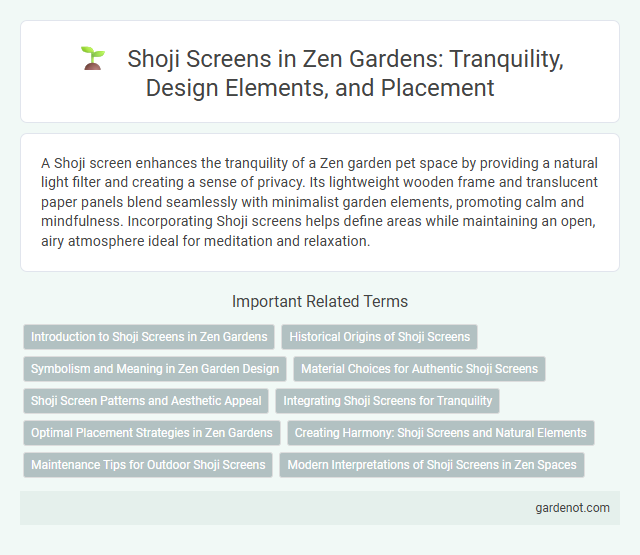A Shoji screen enhances the tranquility of a Zen garden pet space by providing a natural light filter and creating a sense of privacy. Its lightweight wooden frame and translucent paper panels blend seamlessly with minimalist garden elements, promoting calm and mindfulness. Incorporating Shoji screens helps define areas while maintaining an open, airy atmosphere ideal for meditation and relaxation.
Introduction to Shoji Screens in Zen Gardens
Shoji screens in Zen gardens serve as translucent partitions crafted from wooden frames and rice paper, allowing filtered natural light to enhance the serene atmosphere. These traditional Japanese elements create a harmonious blend of privacy and openness, fostering contemplation and tranquility. Their minimalist design complements the garden's aesthetic, emphasizing simplicity and connection with nature.
Historical Origins of Shoji Screens
Shoji screens originated during Japan's Heian period (794-1185) as sliding doors and room dividers crafted from wooden frames and translucent washi paper. These screens reflect traditional Japanese aesthetics, emphasizing simplicity, natural light, and connection with nature, integral elements of Zen garden design. Their enduring use highlights a blend of functionality and artistry rooted in Japanese architectural heritage.
Symbolism and Meaning in Zen Garden Design
Shoji screens in Zen garden design symbolize simplicity, balance, and the harmonious integration of nature and architecture. Their translucent paper panels diffuse light gently, creating an atmosphere of tranquility and mindfulness. These screens embody the Zen principles of impermanence and minimalism, enhancing the meditative experience within the garden space.
Material Choices for Authentic Shoji Screens
Traditional Shoji screens are crafted primarily from lightweight, durable wood such as cedar, cypress, or pine, providing a natural texture and strength essential for their structural integrity. Washi paper, made from the fibers of the mulberry tree, enhances authenticity through its translucent quality, allowing soft light diffusion and maintaining privacy. Opting for natural materials ensures not only aesthetic harmony with Zen garden settings but also longevity and ease of maintenance in authentic Shoji screen construction.
Shoji Screen Patterns and Aesthetic Appeal
Shoji screen patterns, characterized by their intricate lattice designs and translucent paper panels, enhance the Zen garden's tranquil atmosphere by diffusing natural light softly. These geometric patterns not only contribute to visual harmony but also create a seamless connection between indoor and outdoor spaces, embodying traditional Japanese aesthetics. The aesthetic appeal of Shoji screens lies in their minimalist elegance and ability to evoke a sense of calm and balance central to Zen garden design.
Integrating Shoji Screens for Tranquility
Integrating Shoji screens into a Zen garden enhances tranquility by diffusing natural light and creating seamless indoor-outdoor transitions. The translucent rice paper panels soften shadows, promoting a calm and meditative atmosphere essential to Zen aesthetics. Their minimalist wooden frames complement the garden's simplicity, fostering balance and harmony within the serene space.
Optimal Placement Strategies in Zen Gardens
Shoji screens create tranquil divisions in Zen gardens by filtering light and providing privacy without disrupting the seamless flow of nature. Optimal placement involves situating screens near seating areas or walkways to enhance contemplative spaces while maintaining visual connections to key natural elements like rocks or bamboo groves. Positioning Shoji screens where soft, diffused light passes through reinforces the garden's peaceful ambiance and supports meditative practices.
Creating Harmony: Shoji Screens and Natural Elements
Shoji screens enhance Zen gardens by blending natural materials like wood and rice paper with surrounding elements such as rocks, plants, and water, cultivating a serene atmosphere. Their translucent design filters soft natural light, promoting a sense of tranquility and seamless integration between indoor and outdoor spaces. This harmony between Shoji screens and natural features embodies the Zen principles of simplicity and balance.
Maintenance Tips for Outdoor Shoji Screens
Regularly clean outdoor Shoji screens using a soft brush or cloth to remove dust and debris, preventing mold and mildew buildup. Apply a weather-resistant sealant annually to protect the delicate rice paper and wooden frame from moisture and UV damage. Inspect the screens frequently for any signs of wear or damage, repairing tears promptly to maintain their functionality and aesthetic appeal in a Zen garden setting.
Modern Interpretations of Shoji Screens in Zen Spaces
Modern interpretations of Shoji screens in Zen gardens integrate traditional Japanese design with contemporary materials like frosted acrylic and lightweight aluminum frames to enhance durability and ease of maintenance. These screens maintain the classic translucent quality that diffuses natural light softly, fostering tranquility and privacy while blending seamlessly with minimalist aesthetics. Innovative uses include modular layouts and adjustable panels, allowing flexible space division that complements meditative practices and promotes harmony within modern Zen environments.
Shoji screen Infographic

 gardenot.com
gardenot.com